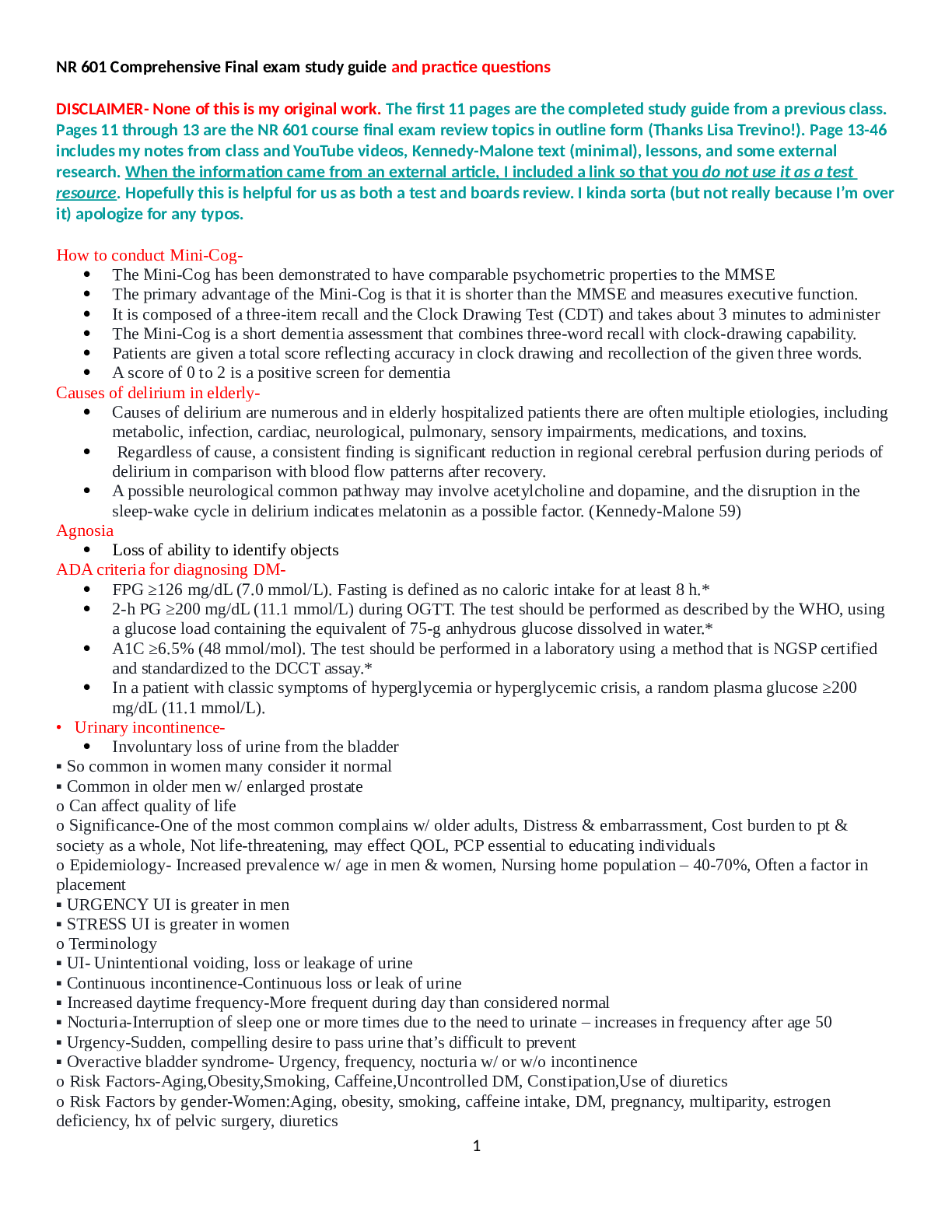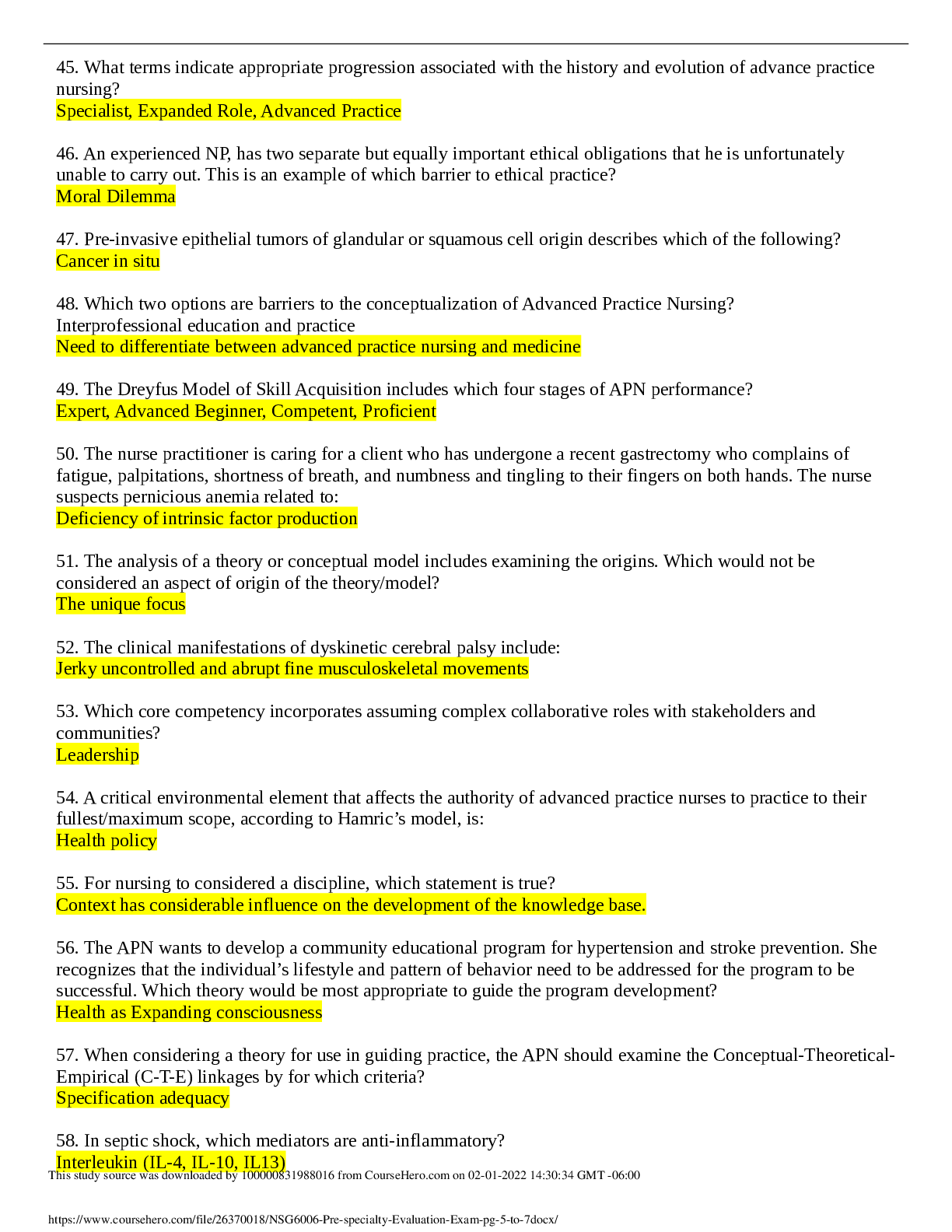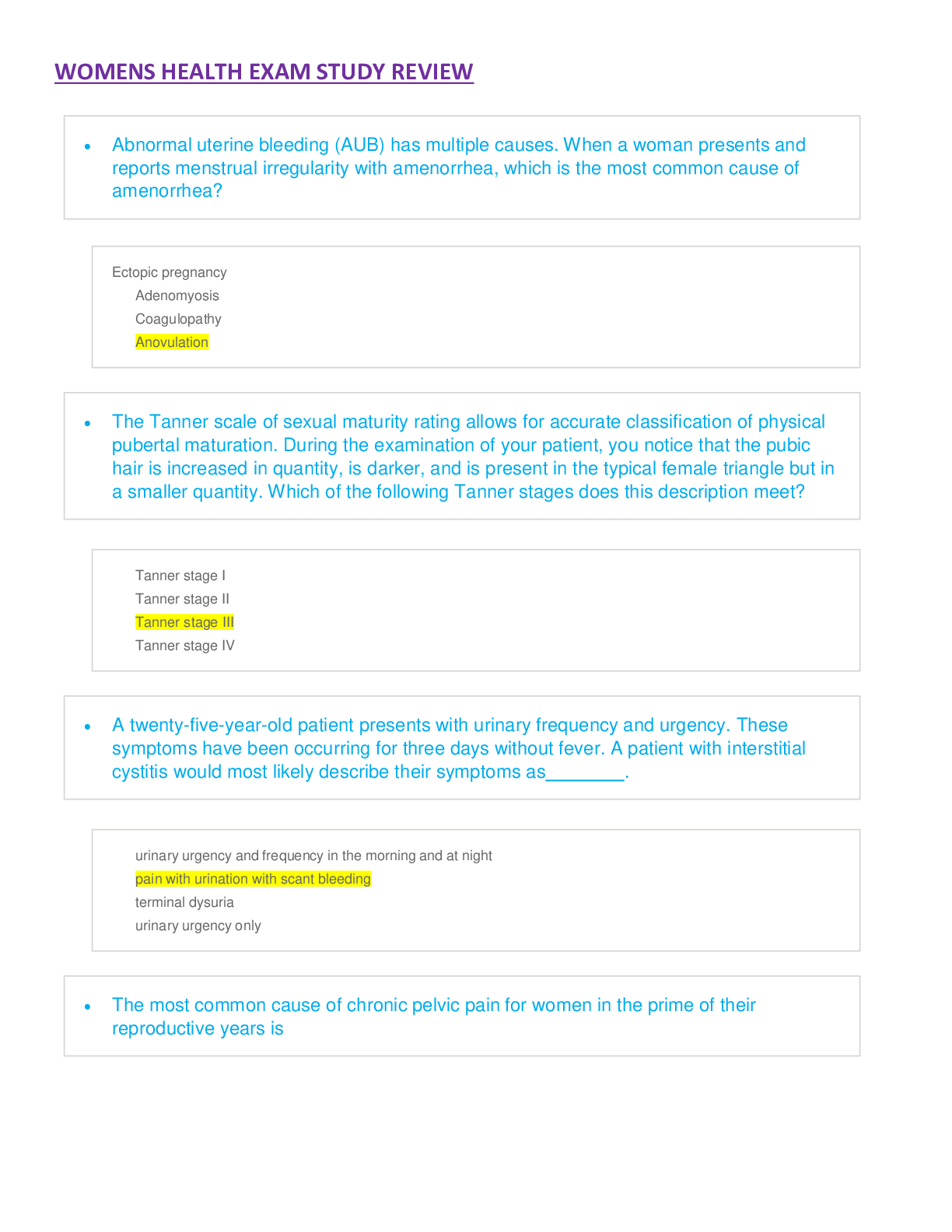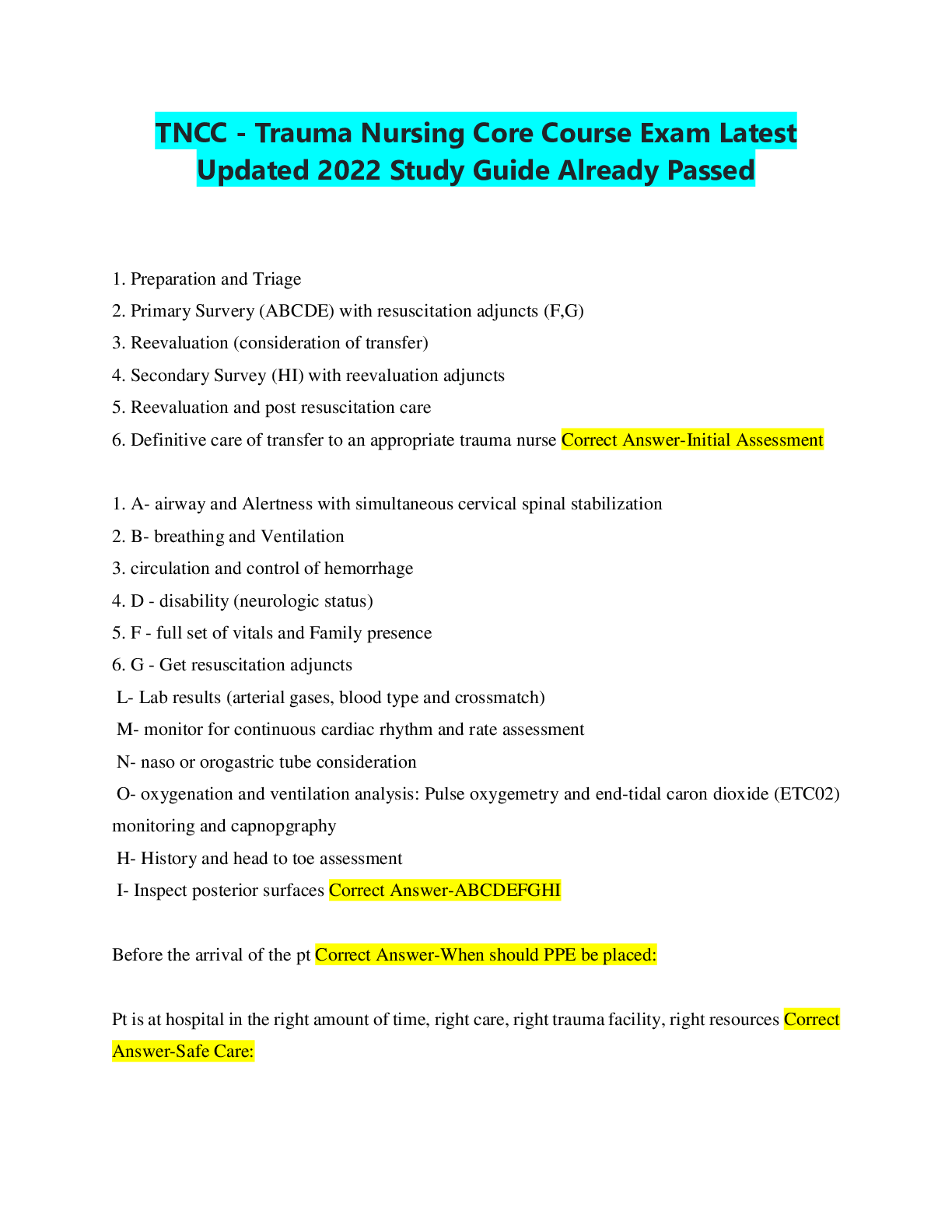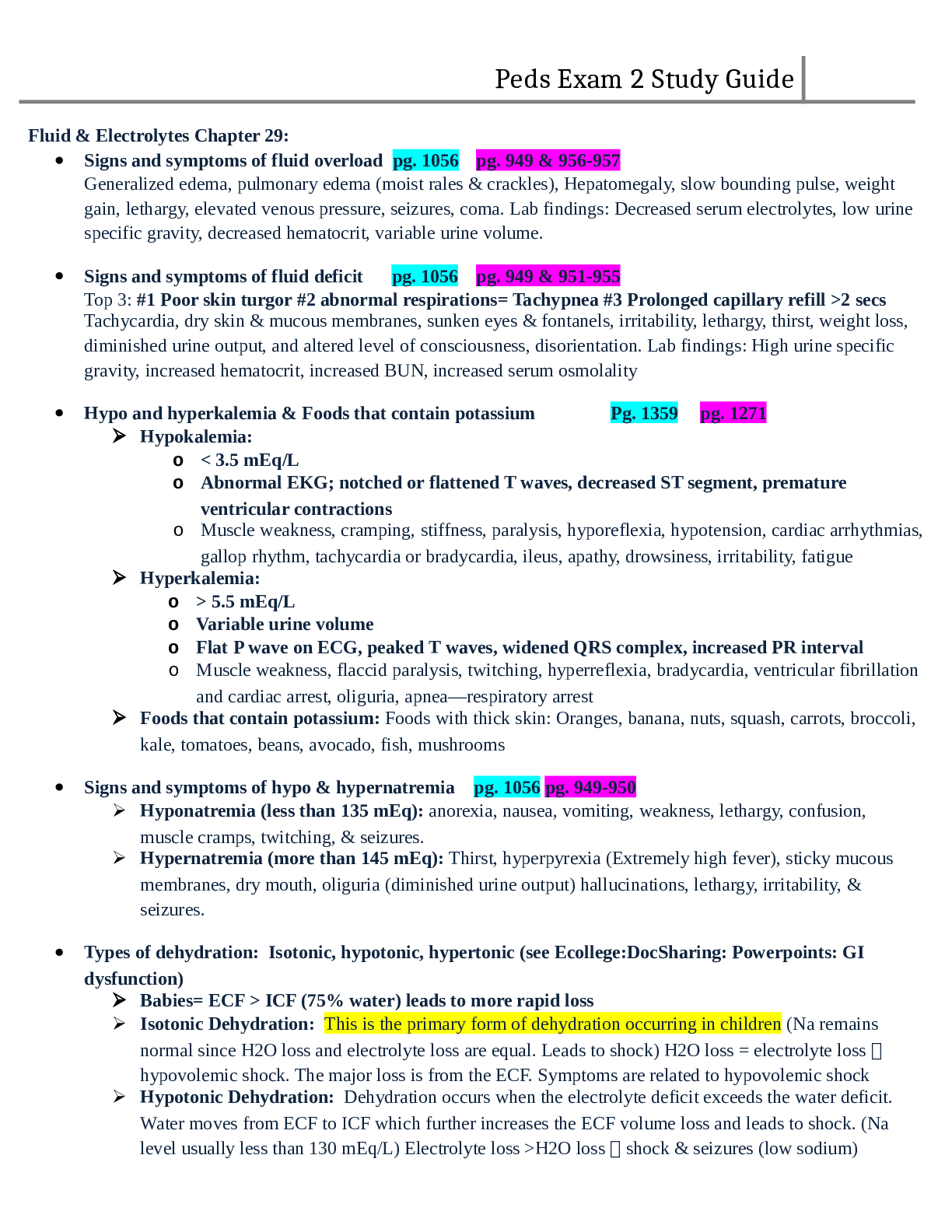*NURSING > STUDY GUIDE > NR503: Population Health Epidemiology and Statistical Principles (All)
NR503: Population Health Epidemiology and Statistical Principles
Document Content and Description Below
Chickenpox, also known as varicella, is a highly contagious disease caused by the varicella-zoster virus (VZV). It is a self-limiting disease that presents during childhood, but can cause severe illne... ss and complications in adolescents and adults. When an individual is infected by the varicella-zoster virus, blister-like rashes can easily develop on the face and stomach, and then spread throughout the entire body. The virus remains dormant in the nerve cells, and may reactivate in later adult years in the form of herpes zoster, or shingles. The infection develops from either direct skin contact or respiratory airborne droplets from an exposed individual. Other symptoms of chickenpox include fever, malaise, headache, and loss of appetite. High risk people, such as infants, elderly, and those with weakened immune systems, may have serious complications from chickenpox. These include bacterial skin infections, pneumonia, sepsis, and encephalitis. The varicella vaccine is the safest and most effective way to prevent chickenpox. Treatments such as calamine lotion, acetaminophen, and antiviral medications, can help relieve symptoms of chickenpox. According to the CDC (2014), chickenpox accounts for more than 9000 hospitalizations in the United States and 95% of Americans had chickenpox before age 18. The highest prevalence of chickenpox is in the 4 to 10-year-old age group, with most cases occurring during the winter and spring. With the vaccine introduced in 1995, the incidence of varicella has dramatically declined by 90% with 99% reduction in the mortality rate in 2008-2011 compared with pre-vaccine years (Leung, Bialek, & Marin, 2015). Determinants of Health There are a few determinants of health that contribute to the development of chickenpox, including social, biology and genetics, and health services. One of the most important determinants of health for people at risk for varicella is access to the vaccine. According to Papaloukas, Giannouli, and Papaevangelou (2014), the rates of chickenpox have decreased over the past 20 years because of the varicella vaccine, which is now a commonly recommended vaccine for children in the United States. Lack of access to health services can greatly impact a person’s health. While the vaccine is readily available, social determinants can also create barriers to high-quality care and education. If families with low socioeconomic status lack resources to meet daily needs, it may be difficult to visit physicians due to finance and transportation issues. Lastly, the biological determinant of age contributes to the development of chickenpox because there is a higher prevalence of the condition in children under ten. Adults over 20 have a risk of death that is 25 times higher when compared to children between one to four (Papaloukas et al., 2014). Host Factors The epidemiological triangle, which consists of the host, agent, and environment, is a model utilized to understand how infectious diseases spread. In the case of the chickenpox, the agent that is the cause of the disease is a microbe, particularly the varicella zoster virus. VZV enters the respiratory tract and conjunctiva, and replicates as a primary infection. Agent factors of varicella include infectivity, which occurs 4 to 6 days after exposure, and secondary attack rate, which occurs 90% within a household (some reference). The host in chickenpox is the same as the reservoir and it is carried by humans and only infects humans. Since only those acting as hosts can transmit the disease, varicella outbreaks are commonly seen among children under ten. Environmental factors include increased disease transmission in overcrowded places. In the United States, there is also a seasonal fluctuation with the highest incidence of chickenpox in the winter and early spring. Role of the Family Nurse Practitioner (FNP) The community health FNP plays a vital role in reducing chickenpox rates by advocating for the varicella vaccination. Community health nurses can also track the effectiveness of treatments through research and data collection from various medical facilities. They can also analyze data to find trends that help healthcare professionals understand the various factors that may affect the spread of the disease and increase the risk of potential health complications. Since 2011, there is no current data on the mortality rates of chickenpox in the U.S. Therefore, case finding, collecting data, reporting and data analysis are important tasks of community health nurses. While VZV associated deaths are rare, finding those specific cases can help understand the conditions leading to death and assess treatment effectiveness. Active surveillance sites are still common despite the dramatic decline of varicella outbreaks. It is helpful to analyze data and statistics to determine trends in different locations and across time to better understand the epidemiology of chickenpox. [Show More]
Last updated: 1 year ago
Preview 1 out of 5 pages

Buy this document to get the full access instantly
Instant Download Access after purchase
Add to cartInstant download
We Accept:

Reviews( 0 )
$8.00
Document information
Connected school, study & course
About the document
Uploaded On
Aug 06, 2021
Number of pages
5
Written in
Additional information
This document has been written for:
Uploaded
Aug 06, 2021
Downloads
0
Views
57

